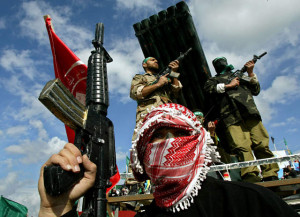
The very pan-Arab nature of the Muslim Brotherhood entails that its disintegration will impact the socio-political and religious make-up of the Middle East and prompt an inevitable shift in power, alliances and allegiances in the region. Moreover, as the Brotherhood loses its last bastion in the Arab world, Qatar, the last pillar of this house of cards, remains but an open gap which will require filling.
Even though Brotherhood leaders have played down their fall from grace, arguing that their departure from Qatar is voluntary; the leadership’ sudden leave was very much perceived as an imposed exile, a final rejection of political Sunni Islam as a potent paradigm, whether or not moderate.
“We wanted to avoid embarrassing Qatar,” said Muslim Brotherhood leader Amr Darrag to the press quickly adding, “Some figureheads of the Freedom and Justice Party [the MB’s electoral arm in Egypt] and the Muslim Brotherhood who have been requested to relocate their headquarters outside of Qatar have agreed.”
This last coup de grace against this political Sunni institution is unlikely “voluntary” and most evidently came about following extraordinary political pressure on the State of Qatar by its GCC neighbours. If not for Saudi Arabia and the UAE relentless crusade against the group since the summer of 2013 the Brotherhood would probably have not become the hunted pariah it is today. Arguably the Middle East would look very different indeed from a political and institutional standpoint should now-deposed Egyptian President Mohammed Morsi had been allowed to fulfil his popular mandate.
So what now? Or rather, how will the political void left by the MB come to translate on the ground at a time when radicalism seems poised to engulf under its black banner the whole of the MENA region?
However once choses to look at developments in the Middle East, the war on Syria and Iraq, or as we might want to rebrand it the fight for the greater Levant (after all IS aka ISIL or whatever other acronyms terror radicals choose to call themselves those days, have already picked and pricked at Egypt, Jordan and Turkey, pushing further into Arab defences) one cannot deny that just as the Brotherhood crumbles into dust, terror militants of the likes the world has never encountered before have come to rise. Where the MB lay, an Islamic abomination, an aberration which knows only hate and blood has come in its stead.
If the world was taught to fear the Brotherhood then what of the monsters of IS and co? Speaking of teaching, many analysts, among whom Finian Cunningham have actually argued that western powers and their allies in the ME’ sudden distaste for the Muslim Brotherhood was brought about by a fear its leadership would come to eclipse monarchies and economic monopolies, thus upsetting an established oligarchy, rather than concerns its leaders harboured friendships with Al Qaeda.
American thinker Fukuyama formulated this visceral fear of Islam as a political model when he suggested that a war be waged within Islam to make it accept Western modernity, secularism and the Christian doctrine or principle: “Give what is Caesar’s to Caesar and what is God’s to God”.
As he noted, the West’s current conflict against all things political Islam is not simply in opposition of terrorism, but instead the fundamentalist Islamic faith which it feels stands against Western modernity and its secular political model. Fukuyama likened political Islam to communism, stressing that the “ideology” represents a greater threat to western thinking and way of life than red Russia ever did.
As the Brotherhood further falls into decrepitude and the self-proclaimed Islamic State – IS – rises, old alliances are being tested to their limits and fault-lines have been laid bare. The old Middle East has but completely disintegrated. The very region which colonial powers shaped to their desires appears poised for a shift of such magnitude that it is likely what we understand today as the ME will soon carry little political, social and even geographical relevance.
Never since the fall of the Ottoman Empire has the region faced such upheaval.
As noted by Walter Smolarek for Liberation, “The explosive rise of the so-called Islamic State has generated some improbable developments in the last few months … US imperialism’s renewed war drive against Syria and Iraq has created a chaotic situation where new regional alliances are being formed and old ones broken.”
If the United States and its partners are still holding on to the belief that they will bring the region to its heel through military intervention, it is exactly such heavy-handed approach which will further fan anti-US imperialism sentiment and allow regional powers to drive a wedge within America’s armour.
Just as Qatar broke free from Saudi Arabia’ shadow on the wake of 2011 Islamic Awakening, putting in jeopardy the Arabian Peninsula order, America’s eternal war on terror might act a catalyst for strategic change, pushing regional powers to rethink their allegiances and immediate interests. Washington’s failure to adequately address the threat which is radicalism, its willingness to play with the fire of extremism to push its “Arab” agenda has created a space within which countries in the ME will seek to expand and affirm their independence.
But as frictions are bound to increase amid opposing political wills, it is the role IS will play in reshaping the region which should really worry us all.
Catherine Shakdam is the Associate Director of the Beirut Center for Middle Eastern Studies and a political analyst specializing in radical movements, exclusively for the online magazine “New Eastern Outlook”.
